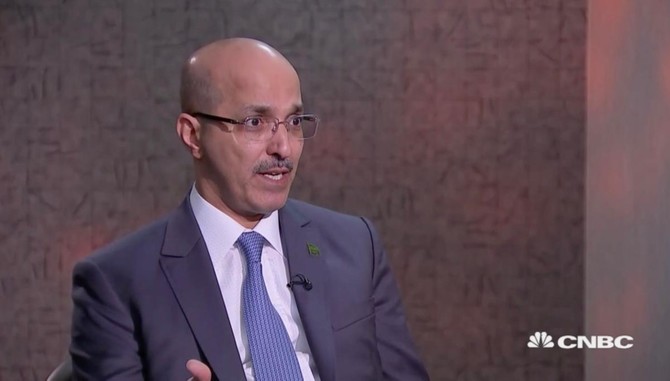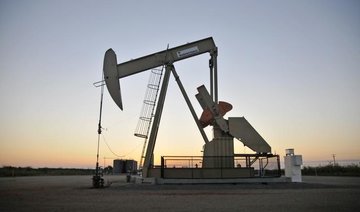DAVOS: The Saudi finance minister has said that oil prices of almost $70 per barrel will help the Kingdom with its deficit reduction goals — but will not change the country’s long-term planning.
Speaking to US broadcaster CNBC on the sidelines of the World Economic Forum in Davos, Switzerland, Mohammed Al-Jadaan said the oil price rise — up from an average of $53 in 2017 and $43 in 2016 to a price late-Wednesday of around $65 — will not change Saudi Arabia’s spending stance.
“We are going to be disciplined in our spending. We are going, also, to support spending on infrastructure, and supporting private sector development, supporting citizens, but within the ceilings that we have announced,” Al-Jadaan said.
The minister also sought to reassure investors that the Kingdom is a secure place to invest following a crackdown on corruption in the country that has seen individuals detained and assets handed over to the government.
“We are creating reform at all levels including the fact that we really need to make sure that investors feel it is a level playing field … that it is fair and very transparent,” Al-Jadaan told CNBC’s Hadley Gamble.
Looking ahead, the finance minister said that Saudi Arabia “will see growth.” Al-Jadaan referenced an IMF announcement in which the organization revised up its expectations for KSA growth, adding that “we are going to see significant growth compared to 2017 in 2018, and then in 2019.”
Al-Jadaan also spoke about the eagerly anticipated initial public offering (IPO) of Saudi Aramco.
The “company is ready, the preparation is on track. I think a lot depends on how the market develops. Obviously, we are not going to IPO at any price. It will need to be the right time, the right market environment,” he said.
***
Below are excerpts from the full interview between Finance Minister Mohammed Al-Jadaan and CNBC’s Hadley Gamble:
HG: I’m joined now by Saudi Arabia’s Finance minister, and I’m going to kick off with asking you, Your Excellency, in terms of what we’re seeing with oil prices right now, about-, hovering around $70, is that going to mean, for this year, at least, that we’re going to see more spending by the Saudi government? Or are we going to see a tightening, again, of the deficit?
MA: Thank you very much. I think the oil price is going to obviously help us, it’s a welcome development, and it is going to help in the deficit reduction. It is not going to change the plan. I mean, the-, the plan is going ahead, we announced mid-term plan, with ceilings, this year, through to 2023. We are going to be disciplined in our spending. We are going, also, to support spending on infrastructure, and supporting private sector development, supporting citizens, but within the ceilings that we have announced.
HG: When you look at what’s happened over the last several months, the private sector could be forgiven for having a bit of hesitancy, certainly with what happened with the Ritz-Carlton situation, a lot of questions about the-, basically, the pace of all of these reforms. Are you encouraged by the fact that you’re seeing growth now, at least in terms of investment in the private sector?
MA: I think, if you look back, when we spoke a year ago, we talked about Vision 2030, and how comprehensive the reform is. This is a financial, economic, social, legal reform, that is touching all aspects of life in Saudi Arabia. We want it to be a model in the region, we want it to make sure that we are a catalyst, we want it to make sure that we develop, and we develop the private sector with us. We put a target to ourselves to support the private sector to grow, to contribute 65% of the GDP, by 2030, and we are going on that track. We are providing a lot of support, we announced, I’m sure you have heard, $40 billion, earlier in 2017, and then another $72 billion of private sector stimulus package. We announced more than 30 billion riyals of citizens’ account, that will also support the purchasing power. The King also announced another 50 billion of stimulus package, throughout this year, for the citizens, so there is a lot that is taking place. We have seen, actually, SMEs growing in 2017 by 10% in revenue, 3% in number of employees, so there is a lot of growth in the private sector, and particularly within oil.
HG: So, in the short to medium-term, what are you doing specifically to really push the economy forward?
MA: I think, if you look at the announcement of the budget for 2018, it is an expansionary budget. We are spending a lot on infrastructure, we are spending a lot on what matters for the private sector, also. So, there is a lot of opportunities, and, in addition to this, there is a very coordinated spending plan between the government, the public investment fund, where it is going to spend north of 80 billion only in 2018, and various projects that will also support the private sector. And we are putting a lot of funding in the capital for development funds, both the industrial and the real estate, to also support the private sector.
HG: What would be your message, then, to foreign investors who want to get involved in the Kingdom’s expansionary plans, and also to investors at home today, given what we’ve seen over the last couple of months, given a lot of the speculation surrounding what happened with the Ritz-Carlton. What’s your message to investors now?
MA: I think it is, again, we are creating a-, a reform at all levels, including the fact that we really need to make sure that investors feel that it is a level playing field. That it is fair, very transparent. So, what is happening in the anti-corruption is just one part of that reform, that we are doing. In addition, we have committed to a transparent process, more information, so we are now reporting on a regular basis on how we are doing on the budget. We are providing the private sector with more information. Saudi Arabia today is different, Saudi Arabia today is not Saudi Arabia five years ago, and it is really changing the way we are making sure that-, even government processes, licensing regime, all of that is being reformed, to make the investors are more welcome, and feeling more at home. We are also making sure that investors are clear that the law is above everybody, and we are going to apply the law in a very clear and transparent way. Finally, we are announcing, and have already issued for public consultation, the new procurement-, the government procurement law, which provides significant improvement, in terms of transparency and level playing field environment.
HG: And, finally, sir, I’d like to get your prediction for 2018. So much was accomplished in 2017, a lot of the things that we talked about at this time last year, you managed to push right on through. What’s going to happen in 2018?
MA: Again, we will see growth. IMF announced yesterday, or the night before, their revised expectations and growth, so we are going to see significant growth compared to ‘17 in ‘18, and then in ‘19. I think the-, between the budget, the public spending, public efficiency and spending, other funding that is coming from IMF, and other development funds, we will see more development. At the same time, you will see more efficiency, more focus on private sector development, more focus on job-creating sectors.
HG: And finally, sir, are we going to see an Aramco IPO this year?
MA: The plan is yes it will happen this year. The company is ready, the preparation is on track. I think a lot depends on how the market develops. Obviously, we are not going to IPO at any price. It will need to be the right time, the right market environment.
HG: Your Excellency, thank you so much for joining us.
(Interview text courtesy of CNBC)















